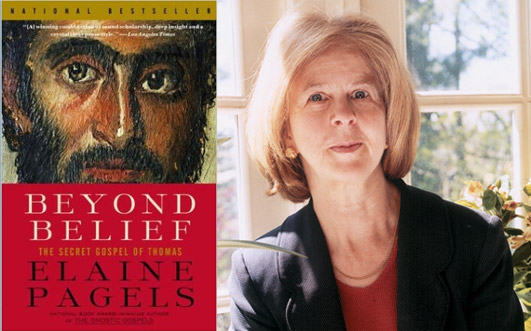|
home | what's new | other sites | contact | about |
|||
|
Word Gems exploring self-realization, sacred personhood, and full humanity
Did Jesus Say He Was God?
return to main-page of the "Jesus" article
author, Dr. Elaine Pagels, Harvard professor
Editor's note: In addition to the discussion below, I would also suggest that you read my article "The gospels of Mathew, Mark, and Luke say that Jesus is man, but John directly contradicts this assertion by saying he was God." The evidence presented there is based on the research of Dr. Elaine Pagels.
**********************************************
The short answer is, no - there is no clear statement in the New Testament ascribed to Jesus asserting, "I am God." He claimed to be the Messiah, which, loosely translated means, God's "agent" or "representative" - but, again, this has applied to others, and can apply to us, too, as we live our lives doing God's will. There are many statements indicating that he is "the Son of God," a label that falls short of affirming membership in the Godhead - as you and I are also sons and daughters of God. Actually, Jesus' favorite term for himself was "Son of Man," that is, a human being.
But one statement was very clear!
These are given to us as the words of Jesus. I am tempted to ask, what part of the phrase "only true God" don't you understand? But, anticipating misunderstanding, he further differentiates between the "only true God" and "Jesus Christ, whom you have sent." These two are different. One is God, the other is sent by God. Or consider this verse from the apostle Paul:
Or this:
"Fair weather" Bible believers Some will swear that every word of the Bible is God-breathed, gilt-edged, and otherwise sanctioned by the high court of heaven - unless the verse in question contradicts pet doctrines taught by their own "one true church." Then we'll see them bring out the long-knives for the Scripture. A small example: in Timothy it says that, "It is the will of God that all people should be saved." Fundamentalists hate this verse and its implications of non-exclusivity. They will attempt to convince you that "the will of God" can be thwarted, that not everyone will be saved; suddenly God is no longer all-powerful - he couldn't possibly achieve universal salvation as per this little verse. Or some will resort to, "all doesn't mean all." In this we see their true colors regarding a "fair weather" belief in an "infallible" book - but, however, they are so very impressed with Satan! - Satan can do anything to anyone at any time... but I steal my thunder from a sister article. Let me tell you "the reason behind the reason" regarding this aversion to "all will be saved": If they were to accept the plain English, if all are to be saved, then how could we scare you with hell-fire and make you pay your tithes? Obviously, fear-based sermons would lose their punch, so instead, we make God a wimp who can't accomplish what he sets out to do. (another "Joker is wild" example) There are abundant examples of this kind of selective fervency for the Bible's infallibility. But, now, here's a really good one for the above John 17:3 discussion: On the internet you will find long and excruciatingly complicated god-talk, purportedly, scholarly articles, about why the phrase "only true God" couldn't possibly mean "only"! I understand that there are mistranslations and copyist errors; I understand interpolations and other imperfections in transmission of message. It remains to be seen whether such degradation of text has occurred here; however, all this misses a larger principle. The gospel of John, produced nearly 100 years after the time of Jesus, written by ones who never heard The Great Teacher speak, brings no substantial bearing to this subject. The purported godhood of Jesus is not a Biblical puzzle to be solved; does not rise-and-fall on the interpretation of a single word or verse. That's just a distraction from more weighty issues in play.
|
|||
|
|

